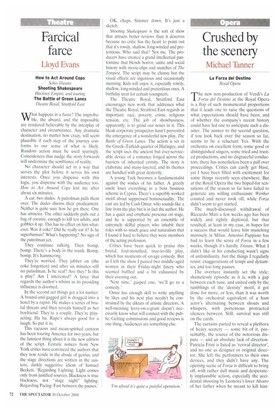Farcical farce
Lloyd Evans
How to Act Around Cops Soho Theatre Shooting Shakespeare Hackney Empire, and touring The Battle of Green Lanes Theatre Royal, Stratford East
What happens in a farce? The improbable, the absurd, and the impossible are rendered believable by the interplay of character and circumstance. Any dramatic destination, no matter how crazy, will seem plausible if each step of the journey conforms to our sense of what is likely. Random action must be used sparingly. Coincidences that nudge the story forwards will undermine the semblance of reality.
No character should act in a way that serves the plot before it serves his own interests. Once you dispense with this logic, you dispense with the audience too. How to Act Around Cops lost me after about six minutes.
A car, two dudes. A patrolman pulls them over. The dudes discuss their predicament. Neither is quite sure how he got there. One has amnesia. The other suddenly pulls out a bag of cocaine, enough to kill ten adults, and gobbles it up. This has no effect on him whatever. Was it coke? Did he really eat it? Is he superhuman? What's happening? No sign of the patrolman yet.
They continue talking. Then bomp, bomp. There's a body in the trunk. Bomp, bomp. It's hammering.
They're worried. They jabber on (the coke forgotten) and after six minutes still no patrolman. Is he real? Are they? Is this a play? Am I interested? A farce that regards the author's whims as its presiding influence is doomed.
In the second act things get a lot nastier. A bound-and-gagged girl is dragged into a hotel by a rapist. He makes a series of brutal threats and then reveals himself as her boyfriend. They're a couple. They're playacting. Ha ha. Rape's always good for a laugh. So put it in, This vacuous and mean-spirited cartoon has been touring America for two years, but the funniest thing about it is the new edition of the script. Ecstatic notices from New York critics have convinced the authors that they now reside in the abode of genius, and the stage directions are written in the austere, darkly suggestive idiom of Samuel Beckett. 'Regarding Lighting: Light comes only from justified sources. Blackness is true blackness, not "stage night" lighting. Regarding Pacing: Fast between the pauses.' OK, chaps. Simmer down. It's just a sketch.
Shooting Shakespeare is the sort of show that attracts better reviews than it deserves because no critic has the heart to point out that it's rowdy, shallow, long-winded and pretentious. Who said that? Not me. The producers have created a grand intellectual pantomime that blends horror, satire and social history with movie-clips and snatches of The Tempest. The script may be clumsy but the visual effects are ingenious and occasionally stunning. Kids will enjoy it, especially rowdy, shallow, long-winded and pretentious ones. A birthday treat for certain youngsters.
The Theatre Royal, Stratford East encourages new work that addresses what the Theatre Royal, Stratford East regards as important: race, poverty, crime, religious tension, etc. The job of showbusiness, apparently, is to grind our noses in it. This bleak corporate prospectus hasn't prevented the emergence of a wonderful new play, The Battle of Green Lanes. The action is set in the Greek–Turkish quarter of Haringey, and the script uses the ancient but ever-serviceable device of a romance forged across the barriers of inherited enmity. The story is elaborate and many-layered, and its themes are handled with great dexterity.
A young Turk becomes a fundamentalist against the wishes of his father. A greedy uncle loses everything in a bent business scheme in Cyprus. There's a superbly worked motif about suppressed homosexuality. The cast are led by Cosh Omar, who sounds like a line from the play but is in fact the author. He has a quiet and emphatic presence on stage, and he is supported by an ensemble of extremely skilful players who inhabit their roles with so much grace and naturalism that I found it hard to believe they were members of the acting profession.
Critics have been quick to praise this brutal, foul-mouthed, true-to-life play, which has moments of savage comedy. But as I left the show I passed two middle-aged women in their Friday-night finery who seemed baffled and a bit exhausted by their evening out.
'Next time,' gasped one, 'we'll go to a comedy.'
Omar has enough skill to write anything he likes and his next play needn't be constrained by the diktats of artistic directors. A well-meaning luvvy-on-a-grant doesn't necessarily know what will connect with the public. Getting commissions and good reviews is one thing. Audiences arc something else.


















































































































 Previous page
Previous page